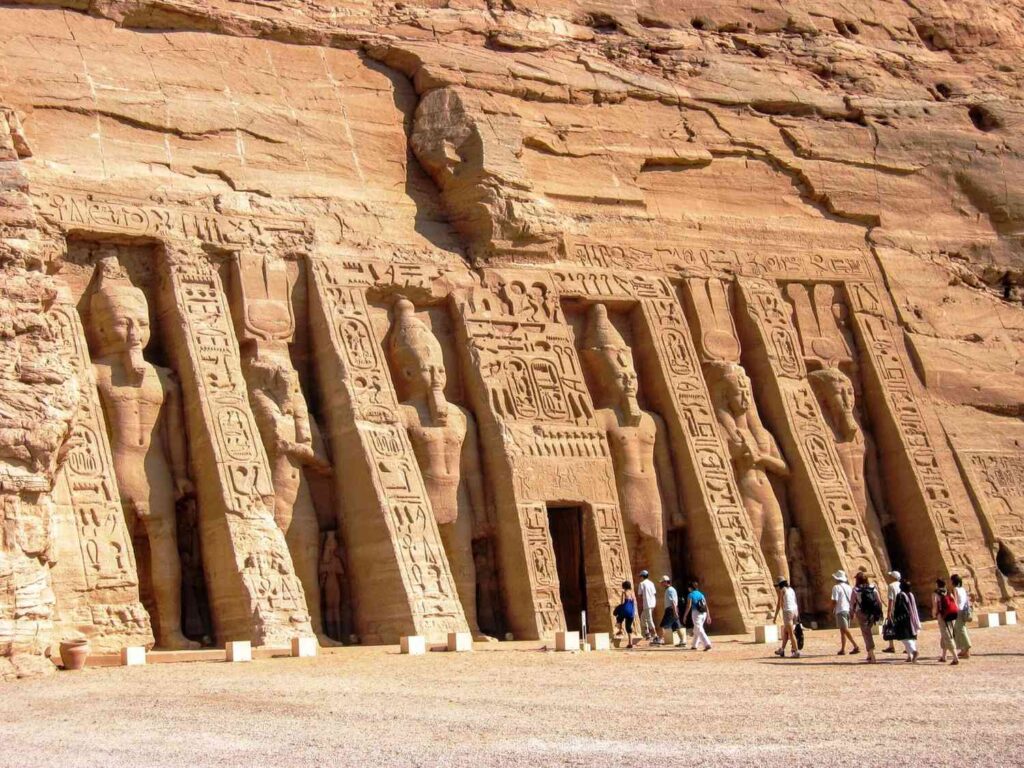Abu Simbel is a small village in the southern part of Egypt. It’s famous for two huge temples carved into the cliffs near the Nile River. These temples were built for Ramses II and Nefertari, important figures from ancient Egypt. People who love history and adventure should visit Abu Simbel to experience the grandeur of this ancient site. In this tour blog, we’ll take you on a virtual journey to Abu Simbel, showing you the interesting places to see, important travel details, and special experiences that make this place unique.
Places to visit:
The Great Temple of Ramses II: Carved into the rock, this temple boasts four colossal statues of Ramses II at its entrance. Inside, you’ll find ornate chambers adorned with intricate hieroglyphs, depicting the pharaoh’s remarkable military conquest and divine stature.
The Temple of Queen Nefertari: Adjacent to Ramses II’s temple, artisans built a smaller but equally impressive temple dedicated to his beloved queen, Nefertari. They adorned the façade with statues of the queen and Ramses II, showcasing their love and devotion.
Abu Simbel Sound and Light Show: Witness the temples come to life in a mesmerizing evening sound and light show. As the sun sets, the temples are dramatically illuminated while the history and legends of ancient Egypt are narrated.
Lake Nasser: This artificial lake was created by the construction of the High Dam in Aswan. It offers excellent opportunities for boating, fishing, and bird-watching. Take leisurely cruise to soak in the stunning views of the temples from the water.
Visa Requirements:
Before embarking on your journey to Abu Simbel, it’s important to consider Egypt’s visa requirements. Most visitors to Egypt require a visa, and you can obtain one at the Egyptian embassy or consulate in your home country. However, some nationalities can get a visa on arrival at major Egyptian airports, including Cairo and Luxor. It’s advisable to check with the Egyptian Embassy or Consulate in your home country for the most up-to-date information on visa requirements.
Cost & Fees
Air ticket fees:
Airfare to Abu Simbel may vary depending on your departure location and the time of booking. You can generally find flights to Abu Simbel through connecting flights from major cities like Cairo or Aswan. The price of an air ticket to Abu Simbel can range from $200 to $500 or more, so booking well in advance can help you secure a better deal.
Travel Costs:
Once you arrive in Abu Simbel, most of your expenses will be related to transportation, tours, and entrance fees. The entrance fee to the temples is around $40 per person. We highly recommend guided tours, and you can expect to pay around $50 to $100 for a guided tour. Transportation within Abu Simbel, such as taxis and boats, is reasonably priced, and a taxi ride within the village usually costs around $5 to $10.
Hotel Costs:
Abu Simbel It has limited accommodation options, but the most popular and comfortable choice is the Seti Abu Simbel Lake Resort. Room prices here range from $100 to $300 per night, depending on the season and room type. It’s advisable to book your accommodations in advance, especially during peak tourist seasons.
Additional Costs:
Apart from the basics, it’s essential to budget for additional costs, including meals, tips, and souvenirs. Plan on spending around $30 to $50 per day on meals if you dine at local restaurants. Tipping is customary in Egypt, and a tip of around 10% is appreciated in restaurants and for tour guides.
Food & Lifestyle
Food Cuisine:
Egyptian cuisine is a delightful mix of flavors and aromas. In Abu Simbel, you can savor traditional Egyptian dishes like koshari (a delicious mix of lentils, rice, and pasta), falafel, and shawarma. Don’t forget to try authentic Egyptian tea or coffee. While dining, relish the serene views of Lake Nasser or enjoy a meal at one of the local restaurants in town.
Lifestyle:
Abu Simbel is a tranquil and remote village. The stunning temples and the nearby lake revolve around them, and life here is unhurried. The locals, who are warm and hospitable, significantly slow down the pace of life compared to major Egyptian cities like Cairo. It’s the perfect place to unwind, appreciate the serenity, and immerse yourself in the rich history of the region.
Tour Essentials:
- Comfortable Footwear: You’ll be doing a fair amount of walking and exploring, so make sure to wear comfortable, sturdy shoes.
- Appropriate attire: Dress modestly when visiting religious sites like temples. Women should cover their shoulders and knees, and men should also dress conservatively.
- Sun Protection: The sun can be quite intense, so pack sunscreen, sunglasses, and a wide-brimmed hat.
- Water and Snacks: Carry a refillable water bottle to stay hydrated, and bring some snacks for those long tours.
- Camera and Binoculars: The temples and the surrounding nature offer fantastic photography opportunities. A good camera and binoculars can enhance your experience.
Additional Experiences:
- Aswan Extension: Consider extending your trip to explore Aswan, a nearby city that offers a wealth of historical and natural wonders, including the High Dam and Philae Temple.
- Nubian Village Tour: Take a boat ride to a nearby Nubian village and get to know the unique culture and lifestyle of the Nubian people.
- Abu Simbel Festival: If your visit coincides with the Abu Simbel Sun Festival, you’ll witness the incredible phenomenon of the sun aligning perfectly with the temple’s statues.
Conclusion:
Abu Simbel is a place where you can go to see ancient Egypt’s amazing temples. They are really big, and the area is peaceful. The people there are friendly and nice. Visiting Abu Simbel can be a bit of work and cost some money, but it’s totally worth it. You’ll learn a lot and have great memories. So, if you like history and adventure and want to explore an awesome place, you should think about going to Abu Simbel.





0 Comments